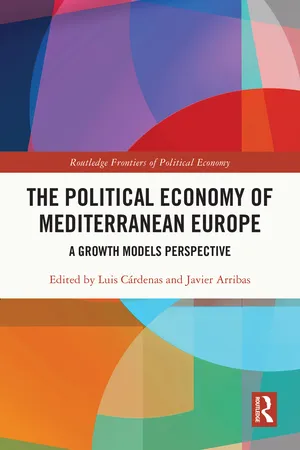
The Political Economy of Mediterranean Europe
A Growth Models Perspective
- 350 pages
- English
- ePUB (mobile friendly)
- Only available on web
The Political Economy of Mediterranean Europe
A Growth Models Perspective
About This Book
Applying the demand-led growth models framework, this book examines the recent macroeconomic performance of the key Mediterranean economies – Italy, Spain, Portugal and Greece – including the responses to the economic and financial crisis (2008), the debt crisis (2010) and the COVID-19 crisis (2020).
As the book explains, the central idea of the growth model approach is that the widespread breakdown of the old labor institutions, such as the existence of strong unions, centralized wage bargaining and the participation of the workforce in corporate governance, has led to a fall in the wage share and a rise in inequality in most advanced economies. Thus, the two main contemporary growth models are usually characterized as debt-led and export-led. In both models, the same processes that cumulatively drive growth, such as over-consumption, also simultaneously undermine the foundations on which this expansion takes hold.
The book examines the extent to which these processes hold true for Mediterranean economics and explores the key factors of their economies including productive capacity, growth of aggregate demand components, wage-led or profit-led regimes, personal income distribution, the foreign sector, the financial sector, labor relations, the labor market and welfare states. In particular, the book examines whether policy responses and state interventions in recent years have led to a divergence between the economies. To what extent are these changes transforming the existing growth models? Are we facing a change in the Mediterranean model or the disappearance of the Mediterranean bloc as a whole?
This book marks a significant addition to the literature on the economics and politics of Southern Europe and the fields of political economy, comparative economics, and macroeconomics more broadly.
Frequently asked questions
Table of contents
- Cover Page
- Half-Title Page
- Series Page
- Title Page
- Copyright Page
- Dedication Page
- Contents
- List of figures and tables
- About the editors
- List of contributors
- Acknowledgments
- 1 Understanding European Mediterranean economies: A growth models’ perspective
- 2 Labour productivity in Mediterranean economies: A tale of failed convergence in the EU
- 3 Economic growth from the aggregate demand side: What drives the macrodynamic in Mediterranean countries?
- 4 The evolution of demand regimes in Mediterranean countries: Between wage devaluation and financial leverage
- 5 A Mediterranean model from a distributional perspective? Analyzing institutional conditionings and distributional outcomes in Italy, Greece, Portugal, and Spain
- 6 How did Mediterranean economies transit to export-led growth? An analysis of the determinants of international competitiveness
- 7 The evolution of the financial sector in Mediterranean economies
- 8 Industrial relations systems in the Mediterranean: Between deregulation, erosion and resilience
- 9 Unemployment fluctuations and job creation dynamics in Mediterranean countries
- 10 The evolution of welfare states in Mediterranean economies
- 11 Transforming Mediterranean economies: Challenges and perspectives in the era of integration and crisis
- Index